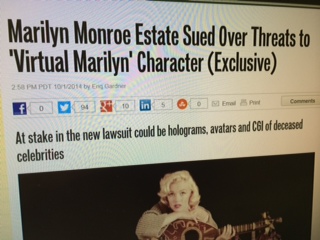Marilyn Monroe Estate Lawsuit: whose image is that anyway? 5 Pointers for a Simple Estate Plan

Usually, we think that one’s property “goes to” those heirs or beneficiaries who are named in the will, right? But, a new Hollywood estate lawsuit puts the estate of Marilyn Monroe in the middle of a dispute over holograms, digital images and the issue of who gets to use one’s likeness. Millions of dollars could be at stake over a matter that most estate attorneys would say should have been resolved in probate court decades ago when the famous actor died.
Who Inherits Your Likeness or iPhone Pix?
Probate lawyers know that most simple wills dispose of personal property. But who owns or who inherits intellectual property like images and copyrights? It depends on what state’s laws apply and what rights may be created in things like images and digital media. Can someone use your image if you texted a picture of you, or is that infringement? Some states, like California, can be at the forefront of intellectual property rights laws, while other states may not be as pointed or decisive.
Virtual Marilyn LLC claims to own copyrights over the likeness of Marilyn Monroe. Evidently the estate of Marilyn Monroe disagrees. The estate, which the Hollywood Report suggests earns over $30 Million a year in licensing income, objects to the use of Marilyn’s “identity” and “persona.”
What Can We Learn from Marilyn’s Estate?
Q: Does this Estate Lawsuit have any application for John and Jane Doe’s estate or their family on Main Street?
A: Yes, say estate attorneys.
Here are five pointers to take away from this Marilyn Monroe Estate Lawsuit.
1) First, have a will that deposes of all personal property to a specific beneficiary. If you like photography or are an artist, make specific reference to your work.
2) Think outside the digital box. Second, recognize that while you may not have copyrights or patents, you do have digital information like postings on Facebook, pictures on your iphone, which include your image and likeness. Like frequent flyer miles, consider these digital assets when you are writing your will and think about who you will want to inherit them.
3) Use a trust. Consider using a living or revocable trust with your will in your estate plan. If you end up selling a picture or your heirs can make money off your image, those rights can be held in the trust with an almost perpetual duration. The trust can even create an LLC or a corporation to do business in. Seems far fetched? Some of the most recognizable images are not “owned” by anyone but are out there in the public domain, which can mean a loss of potential royalties to the creator. If you right books, post online, blog, share photos, etc., don’t you want to be paid if someone uses your images for a commercial purpose?
4) KISS. Keep it simple. Unless you are creative and creating, you may not worry about digital images or your likeness. That’s OK. A basic estate plan with a will, revocable trust and a power of attorney work just fine. But remember, it’s doubtful that Marilyn or her estate ever imagined that her likeness would still be in such demand decades after her death or that it would generate millions of dollars in revenues. A little thought and planing can go a long way.
5) Understand the big picture. At the heart of this dispute may not be persona andholograms but rather how one disposes of their property at death and how that property is managed. Living trusts and doing business in an entity like a limited liability company are now not just for the super rich or famous. They are easily understood, affordable, and widely accepted. You don’t need to be a Silicon Valley e-start up Billionaire to have a basic estate plan.